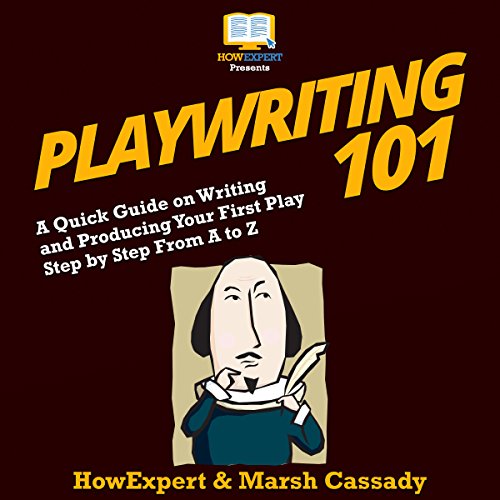
Playwriting 101
A Quick Guide on Writing and Producing Your First Play Step by Step from A to Z
Artikel konnten nicht hinzugefügt werden
Der Titel konnte nicht zum Warenkorb hinzugefügt werden.
Der Titel konnte nicht zum Merkzettel hinzugefügt werden.
„Von Wunschzettel entfernen“ fehlgeschlagen.
„Podcast folgen“ fehlgeschlagen
„Podcast nicht mehr folgen“ fehlgeschlagen
Für 7,95 € kaufen
Sie haben kein Standardzahlungsmittel hinterlegt
Es tut uns leid, das von Ihnen gewählte Produkt kann leider nicht mit dem gewählten Zahlungsmittel bestellt werden.
-
Gesprochen von:
-
Phillip Goodchild
-
Von:
-
HowExpert
-
Marsh Cassady
Über diesen Titel
To write for the theater, you need to know about theater. Ideas are easy to come by. Examine your background, interest, and beliefs. Examine the world around you. Exercises can help you come up with ideas. Choose the audience you want to reach, and write to that audience. To learn to write dialogue, listen to and record everyday conversations. Dialogue should sound like ordinary conversations but have more direction.
Know as much as you can about your central characters. Do a character analysis. Choose the character traits to emphasize. A character should come across as both typical and individual. Most plays have a plot, which involves conflict between the protagonist and the antagonist. The parts of a plot are: inciting incident, rising action, turning point, climax, and falling action. Other types of organization for a play are circular and thematic.
Before starting to write, you need to develop a central idea. Plays exist for a number of reasons - entertainment, to bring attention to something, and to teach. You need to decide what you want to accomplish. It’s easier to gain an audience’s interest if you start with a theme with which they agree.
A play needs a sense of universality. A play should be unified, but it also needs contrast. Since theater is a collaborative art, the director, actor, and designers may see the different facets differently than you do. It’s not difficult to have a well-written production. Possible markets are schools, organizations, and professional theater. Finished plays have to follow a particular format.
About the expert: Marsh Cassady has had 38 plays published and/or produced - including off-Broadway. A former theater professor with a PhD degree, he started a playwriting program at Montclair State in New Jersey that included beginning and advanced classes, workshops, and individual projects. He also taught creative writing, including playwriting, at UCSD. Marsh is the author of 60 published books in a variety of genres, from theater textbooks to novels to true crime, and hundreds of shorter pieces. For about 35 years, he led all-genre writing workshops in San Diego and in Rosarito, BC, Mexico, where he has lived since 1997.
©2018 HowExpert (P)2018 HowExpert


